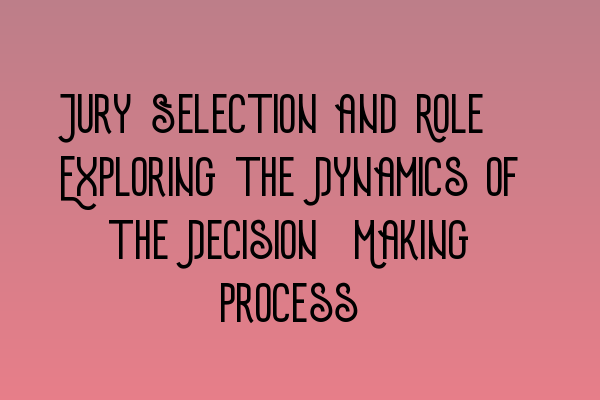Jury Selection and Role: Exploring the Dynamics of the Decision-Making Process
Welcome to the SQE Criminal Law & Practice Law UK blog! Today, we delve into the fascinating world of jury selection and the dynamic role they play in the decision-making process. A fair and impartial jury is the backbone of a just legal system, ensuring that the accused receives a fair trial.
The Importance of Jury Selection
Jury selection is a critical stage in any criminal trial. The process involves carefully choosing individuals from the jury pool who will hear the evidence presented, evaluate the credibility of witnesses, and ultimately make a judgment on guilt or innocence.
During jury selection, both the prosecution and defense have the opportunity to question potential jurors to ensure they are impartial and free from bias. This careful vetting is essential to ensure a fair trial, as any bias or preconceived notions could taint the decision-making process.
However, jury selection is not just about excluding biased individuals but also about creating a diverse jury that reflects society. This diversity ensures that a range of perspectives and life experiences are represented in the decision-making process, providing a well-rounded approach to justice.
The Dynamics of the Decision-Making Process
The dynamics of the decision-making process in a jury trial are complex and multifaceted. Jurors must carefully consider the evidence presented, critically assess witness credibility, and apply the law as instructed by the judge.
One key aspect of the decision-making process is the influence of individual jurors on each other. Juror deliberations involve discussions and debates, with each juror bringing their unique perspectives and interpretations of the evidence. This collaborative process plays a crucial role in reaching a unanimous verdict.
It is worth noting that jury deliberations are private, allowing jurors to freely express their opinions without fear of judgment or repercussion. This secrecy promotes open and honest discussions among jurors, enabling them to reach a fair and just decision based on the evidence presented during the trial.
Related Articles
If you’re interested in learning more about the SQE exams and preparing for them, make sure to check out these related articles:
- SQE 1 Practice Exam Questions
- SQE 1 Practice Mocks FLK1 FLK2
- SQE 2 Preparation Courses
- SQE 1 Preparation Courses
- SRA SQE Exam Dates
These articles provide valuable insights and resources to help you succeed in your SQE exams and excel in your legal career.
Conclusion
The selection and role of a jury are pivotal in ensuring a fair trial and upholding justice. The careful selection of impartial and diverse jurors, along with the dynamic decision-making process, allows for a comprehensive assessment of the evidence and a just verdict.
We hope this exploration of jury selection and the dynamics of the decision-making process has been informative. Stay tuned to the SQE Criminal Law & Practice Law UK blog for more engaging and insightful content.
